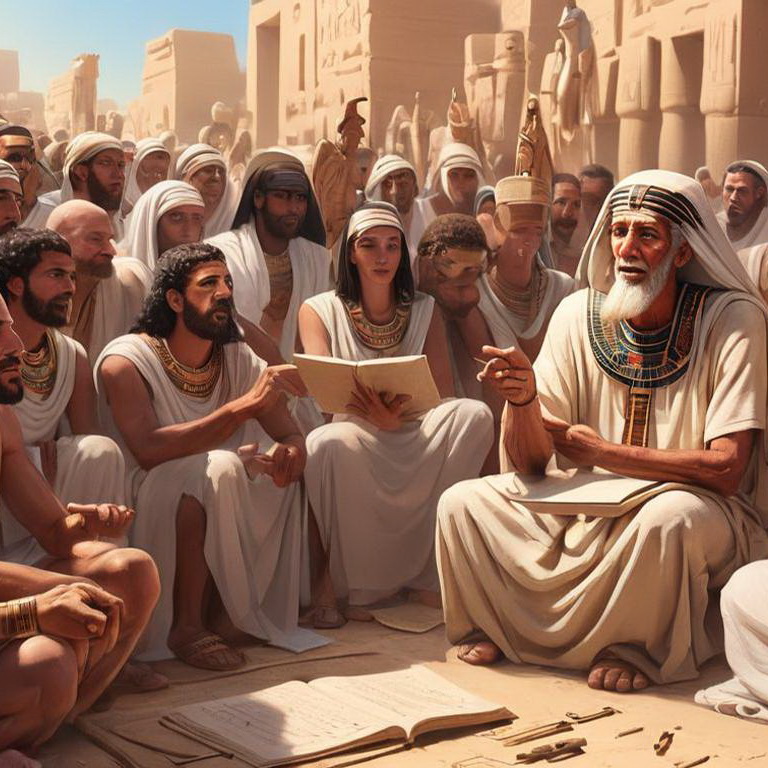Ancient Egyptian Wisdom for Today’s Online World: Lessons from Khakheperraseneb

In the vast expanse of human history, wisdom often emerges from the most ancient of sources, reverberating through the ages with timeless relevance. One such source is Khakheperraseneb, an Egyptian scribe who lived during the reign of Senusret II (circa 1897-1878 BCE). Presumed to be the author of the “Sayings of Khakheperraseneb,” his reflections capture the essence of human experience and offer profound insights that resonate deeply with our modern, digitally connected world.
Khakheperraseneb’s era was one of significant intellectual and cultural development in Egypt, characterized by flourishing literature, art, and statecraft. As a scribe, he occupied a crucial role in documenting and disseminating knowledge, thereby shaping the intellectual landscape of his time. His “Sayings” are a collection of poignant observations and meditations on the human condition, many of which are strikingly applicable to the dynamics of contemporary social interactions, especially online.
Consider this quote from Khakheperraseneb: “It is pain to be silent to what one hears, but it is futile to answer the ignorant; to reject a speech makes enmity; their heart does not accept the truth, one cannot bear a statement of fact, a man loves only his own words.” This statement encapsulates a timeless truth about communication and conflict. In today’s digital age, where social media platforms have become arenas for public discourse, the challenges of engaging with differing opinions are ever-present.
The pain of remaining silent when encountering misinformation or offensive remarks online is a familiar feeling. Many of us grapple with the impulse to correct inaccuracies or defend our viewpoints. However, Khakheperraseneb’s wisdom cautions against futile engagements. Responding to those who are not open to genuine dialogue often leads to hostility rather than understanding. In the online world, where anonymity can embolden individuals to express extreme views without accountability, this advice is particularly pertinent. It reminds us to choose our battles wisely and recognize when silence may be more powerful than words.
Moreover, Khakheperraseneb’s observation about the human tendency to love only one’s own words is particularly relevant in the age of social media. Platforms like Facebook, Twitter, and Instagram often serve as echo chambers, where algorithms curate content that reinforces our pre-existing beliefs. This phenomenon can create a false sense of consensus and make it challenging to engage constructively with diverse perspectives. Khakheperraseneb’s insight encourages us to be mindful of our biases and strive for humility in our interactions, recognizing that our understanding of truth is always partial and subject to growth.
Another quote from Khakheperraseneb reads, “Examine every matter that comes before you, but do not let your heart become wearied; for every effort will be rewarded.” This advice speaks to the importance of perseverance and critical thinking. In an age of information overload, where we are bombarded with news, opinions, and data from countless sources, the ability to critically assess information is crucial. Khakheperraseneb’s counsel reminds us to approach each piece of information with a discerning mind, while also guarding against the burnout that can come from constant scrutiny. By balancing vigilance with self-care, we can navigate the complexities of the digital landscape more effectively.
The relevance of Khakheperraseneb’s wisdom extends beyond individual interactions to broader societal implications. His reflections on the nature of truth and communication invite us to consider the ethical responsibilities of digital citizenship. In an era where misinformation can spread rapidly and have significant consequences, fostering a culture of respectful, informed dialogue is essential. Khakheperraseneb’s teachings challenge us to contribute to this culture by valuing truth, practicing empathy, and engaging with others in a spirit of genuine curiosity and openness.
In conclusion, the “Sayings of Khakheperraseneb” offer a rich repository of wisdom that transcends time and context. As we navigate the complexities of today’s online world, his insights provide valuable guidance on communication, critical thinking, and ethical engagement. By heeding the lessons of this ancient Egyptian scribe, we can cultivate a more thoughtful, compassionate, and connected digital society.


